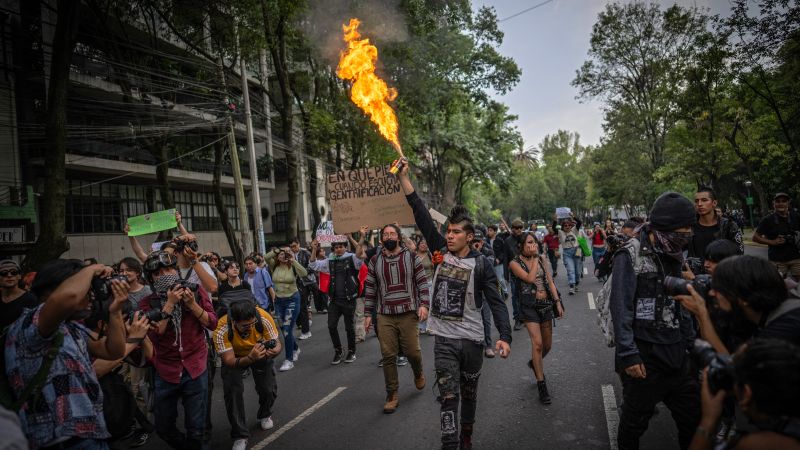CNN
—
Mexico City officials have announced a 14-point plan to address the capital’s housing and gentrification problems, which sparked large and sometimes violent protests earlier this month.
Mexico City Mayor Clara Brugada said officials will propose a law to regulate rental prices, strike a balance between the rights and obligations of landlords and tenants, prevent people from being displaced and regulate short-term rental properties.
Many residents say they’ve been priced out of their neighborhoods, in part because of overtourism, short-term home rentals and an influx of people and businesses with higher purchasing power.
Brugada said on Wednesday that an “objective and rigorous methodology” will be worked out to regulate temporary housing rentals to prevent residents from being displaced and avoid “the loss of the community’s roots and identity.”
The city government will also set up an agency to enforce the rent law and penalize offenders.
Brugada said living in Mexico City should not be a privilege for a few, but rather a guaranteed right for all its residents.
“The issue of gentrification is one of the most important issues in the city today, but it is not new either. It is not only an issue for the city, but also for the entire world, and it means the displacement of thousands of families,” the mayor said.
The proposal comes days after residents demonstrated on July 4 against gentrification and the rising cost of living in the Mexican capital, which some have blamed on an influx of foreigners from the United States and Europe.
While the demonstration was largely peaceful and reflected growing anger about inequality in the city, some protesters vandalized stores in wealthier neighborhoods and used anti-immigration language that Mexican President Claudia Sheinbaum criticized as xenophobic.
Frente Anti Gentrificación Mx, one of several groups that helped organize the protest, pushed back against Sheinbaum’s characterization, saying the demonstration was meant to highlight the plight of those priced out of their homes and to demand reforms from the government.
“We are not against migration because gentrification is not a problem of migration (which is) a human right. We are against violence as a government model,” spokesperson Yessica Morales told CNN last week.
Housing costs in the country have soared to 286% since 2005 while real wages have gone down by 33%, according to Morales, citing data from the National Institute of Statistics and Geography and the Federal Mortgage Society.
Mexico City’s mayor on Wednesday called on protesters to engage in dialogue.
“To the people who are promoting the marches and mobilizations, I say that with all the more reason we will open the necessary discussions with them on this issue,” she said.
Experts say gentrification in Mexico City has been happening for decades and can’t be blamed on immigration alone. But the arrival of short-term rental platforms like Airbnb and remote work policies during the Covid-19 pandemic turbo-charged the gentrification debate in recent years.
Airbnb defended its activities in Mexico City last week, saying it helped generate more than $1 billion in the local economy last year, and argued that guests who booked accommodations also spent money on shops and services in the capital.
The issue is not unique to Mexico City. Across Europe, residents of tourist destinations have also protested gentrification, while local governments have announced restrictions on short-term rentals in several cities.

